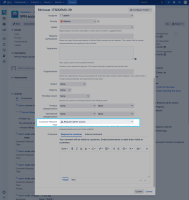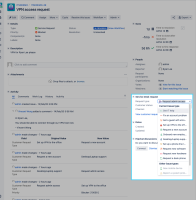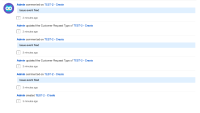-
Bug
-
Resolution: Fixed
-
Low
-
4.5.4, 4.5.3
-
None
-
1
-
Severity 2 - Major
-
38
-
Issue Summary
Editing a Customer Request Type in the right sidebar does not trigger notifications
Steps to Reproduce
- Under Service Desk request panel (right side of the issue screen), click on the pencil to edit the Request type.
- Select a different Request type.
- Confirm the change.
Expected Results
Step 2 should send an email informing agents that the request type has been updated
Actual Results
No mail is sent.
Workaround
Currently there is no known workaround for this behavior. A workaround will be added here when available
| Form Name | |||||||||||
|---|---|---|---|---|---|---|---|---|---|---|---|





<3 thanks!
Can we update the status of this issue to show that?